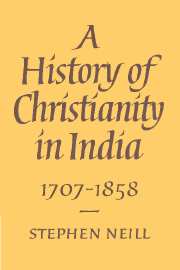Book contents
- Frontmatter
- Contents
- Preface
- Editorial Note
- Abbreviations
- 1 India and Political Change, 1706–86
- 2 The Tranquebar Mission
- 3 The Thomas Christians in Decline and Recovery
- 4 Roman Catholic Missions
- 5 Anglicans and Others
- 6 The Suppression of the Jesuits
- 7 The New Rulers and the Indian Peoples
- 8 Government, Indians and Missions
- 9 Bengal, 1794–1833
- 10 New Beginnings in the South
- 11 The Thomas Christians in Light and Shade
- 12 Anglican Development
- 13 The Recovery of the Roman Catholic Missions
- 14 Education and the Christian Mission
- 15 Protestant Expansion in India
- 16 Indian Society and the Christian Message
- 17 Towards an Indian Church
- 18 The Great Uprising
- APPENDICES
- Notes
- Select Bibliographies
- Index
14 - Education and the Christian Mission
Published online by Cambridge University Press: 07 September 2009
- Frontmatter
- Contents
- Preface
- Editorial Note
- Abbreviations
- 1 India and Political Change, 1706–86
- 2 The Tranquebar Mission
- 3 The Thomas Christians in Decline and Recovery
- 4 Roman Catholic Missions
- 5 Anglicans and Others
- 6 The Suppression of the Jesuits
- 7 The New Rulers and the Indian Peoples
- 8 Government, Indians and Missions
- 9 Bengal, 1794–1833
- 10 New Beginnings in the South
- 11 The Thomas Christians in Light and Shade
- 12 Anglican Development
- 13 The Recovery of the Roman Catholic Missions
- 14 Education and the Christian Mission
- 15 Protestant Expansion in India
- 16 Indian Society and the Christian Message
- 17 Towards an Indian Church
- 18 The Great Uprising
- APPENDICES
- Notes
- Select Bibliographies
- Index
Summary
MISSIONARY BEGINNINGS
Scotland came late into the missionary enterprise in India. The man who more than any other changed the outlook of the Scottish church was the notable Thomas Chalmers (1780–1847), one of the great preachers of the day, who combined with a strong evangelical faith views on social reform which might be considered advanced even in the twentieth century. A somewhat exuberant listener has recorded the impression left on the minds of the hearers by Chalmers' inaugural lecture as professor at St Andrews in November 1823, when ‘the eloquence of the mighty enchanter, breaking through all conventional trammels, shone forth in all the splendour of its overpowering glories’.
In 1824 Dr James Bryce, the first Scottish chaplain in Calcutta, drew the attention of the General Assembly of the Church of Scotland to the possibilities of India as a field for missionary endeavour. His plan was for a college ‘under the ecclesiastical superintendence of the Kirk Session of St Andrew's Church, for the training of those who might in due course be employed to preach from the pulpit of St Andrew's to such native congregations as might attend their ministry’.
Soon after the arrival of Dr Chalmers in St Andrews, his attention was directed to a student who had arrived two years earlier at the age of fifteen and had earned the highest honours in Greek, Latin, logic and natural philosophy.
- Type
- Chapter
- Information
- A History of Christianity in India1707–1858, pp. 307 - 330Publisher: Cambridge University PressPrint publication year: 1985



